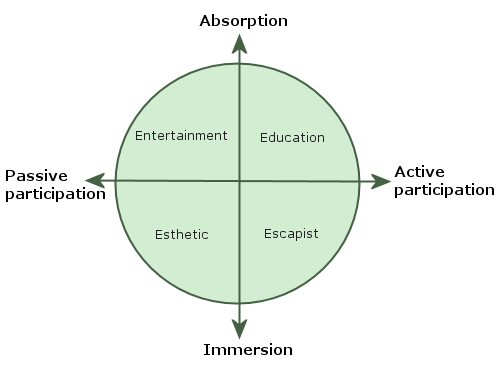 Escapist experiences are sort of the opposite of pure entertainment – with escapism, you are completely immersed and actively involved. “Theme parks, casinos, virtual reality headsets, chat rooms, or even a game of paint ball” – all are examples of escapist experiences.
Escapist experiences are sort of the opposite of pure entertainment – with escapism, you are completely immersed and actively involved. “Theme parks, casinos, virtual reality headsets, chat rooms, or even a game of paint ball” – all are examples of escapist experiences.
You might have noticed – many of these also involve entertainment. In fact, these combinations happen a lot with experience planning. Think about an IMAX theater – you get immersed, but in a big, entertaining way. Also, when participating in an escapist experience, you’re not necessarily watching others do something – instead, you are the actor, and you affect the performance. Think Runescape again.
BThis is possibly the hardest realm for a library to create (hey Dave, how about Paintball at the library 🙂 but not impossible. For example, my library is planning a haunted house type of event around Halloween. That’s escapist for you!
And let’s use Runescape again as an example. It’s an escapist experience, and I’ll bet that a third of our in-library computer users are playing it right now. And that’s not a bad thing. They are interacting with 60,000 other Runescape players, so there’s a lot of social interaction going on. On the techie side, they’re basically learning to chat/IM with each other – that’s cool. And they’re experiencing a “live” version of a basic fantasy novel (well, minus the plot, of course).
So – maybe we should do something to support our customers, like:
- Create a Runescape page, or a gaming page with Runescape info as an offshoot. It could point to the game and other useful websites about the game. Maybe even give some basic “how to’s” to help interested customers.
- Point to other avatar online games.
- Point to related books/videos (probably books on topics like online gaming, chatting/IM, etc.)
- Hold a Runescape Day at the library! Reserve some PCs for Runescape players, even have a librarian get online and have a virtual “meet and greet” with everyone.
And with that idea in mind, you can easily translate that into other areas, like Flickr, Furl, etc. Teach users about online social interaction, gaming, etc via on-site classes and web guide pages.
Just some pointers for starters.